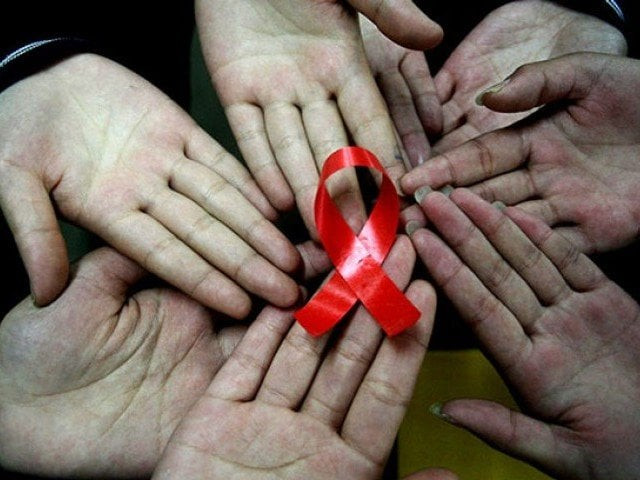Control programme fails to contain HIV in Punjab
Only 11,000 patients have access to free medicines

Thousands of unregistered Human Immunodeficiency Virus Acquired Immunodeficiency Syndrome (HIV-AIDS) positive patients have become a mounting challenge for the Punjab Health Department.
These unregistered patients are also becoming one of the major reasons for HIV-AIDS in the region, The Express Tribune has learnt.
The Punjab Health Department officials said only 11,000 patients had access to free medicines while around 90,000 patients in Punjab were not even getting medicines and their medical status was unknown.
On the other hand, due to the non-registration of patients as well as issues of people avoiding treatment, used syringes and unsafe sexual practices are major factors in the speedy increase of HIV-AIDS positive patients.
The Punjab HIV-AIDS Control Programme and Punjab Health Department were passing through a tough situation as it had failed to convince thousands of HIV positive patients to do their treatment.
The Punjab AIDS Control programme officials said that there were 190,000 AIDS patients in the country and half of these patients were residing in Punjab.
Punjab Health Department was giving free of cost medicines to the patients. However, due to taboos, societal attitudes and various other reasons, these 90,000 patients were hesitant to obtain medication for themselves.
People with HIV-AIDS are often stigmatized and due to poor attitudes towards positive patients, the victims of this virus were avoiding any kind of treatment and suffering in silence.
Non-registered patients are yet another factor in the spread of the virus. Health experts view this increasing number of patients as alarming and termed the situation critical for society.
A senior official of the Punjab Health Department said there were a total of 190,000 cases of HIV.
“Around 45% of HIV-AIDS spreading in the country is due to the practice of used syringes. There is still a lack of awareness among the public and positive patients are avoiding treatment.
Only awareness and precautionary measures can protect the people from this disease.”
“Sadly, our people need to get convinced for basic treatment against sexually transmitted infections (STI) even though treatment is free,” Punjab AIDS Control Programme Director Dr Muneer Malik said.
Read more: HIV positive child dies in Rato Dero
“Punjab government is trying its best to counter AIDS and for this purpose, we have taken a big step as the government is giving free of cost medicines to the private sector. The purpose is just to give facilities to the HIV-AIDS patients as those cases were avoiding to get medicines from the government.”
They can get medicines from the private sector, he added. “However, there is a need to change societal attitudes as patients often refuse treatment due to the stigma attached to this virus.
We cannot achieve our goals of ending this pandemic unless we counter those factors that were discouraging HIV-AIDS patients from seeking treatment,” said Punjab Primary and Secondary Healthcare Department (P&SHD) Secretary Muhammad Usman.
“Immediate identification and treatment of HIVAIDS can secure life of the patients. The Punjab government has taken various steps to control the virus as we now announced compulsory AIDS test of TB patients. We are also maintaining the secrecy of AIDS registered patients,” Punjab Health Minister Dr Yasmin Rashid said.
She added that the health department issued Insaf Medicine Cards to facilitate HIV-AIDS patients. Punjab’s various cities including Lahore, Kot Momin, Multan, Faisalabad and Gujrat have a higher number of HIV cases.
Speaking on the condition of anonymity, a gynaecologist said that “It is right to say that used injections are the reason of HIV-AIDS spreading but due to stigma and taboos, especially among male patients, people feet discouraged to take treatment.



















COMMENTS
Comments are moderated and generally will be posted if they are on-topic and not abusive.
For more information, please see our Comments FAQ